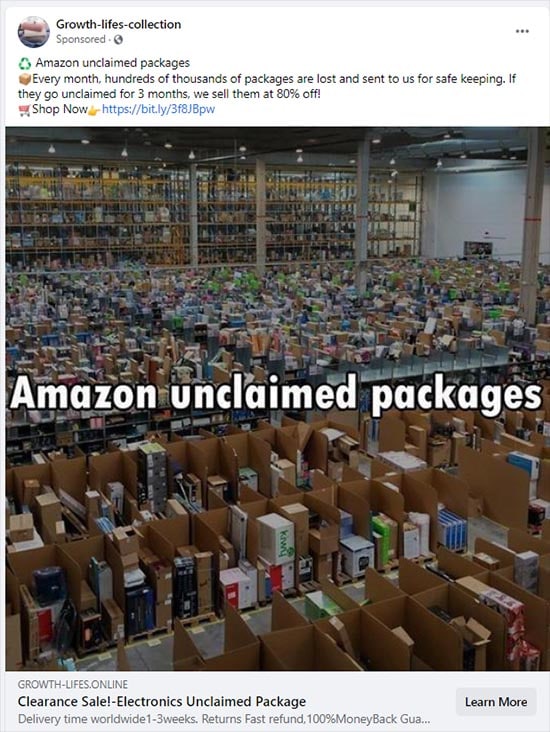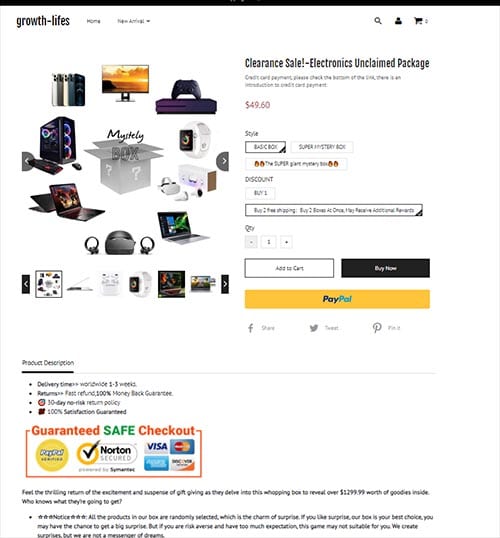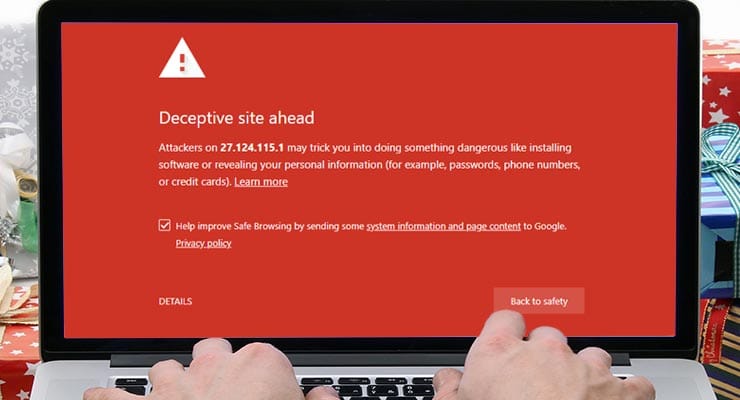Facebook ads claiming to sell “unclaimed Amazon packages” are scams
Posts and adverts on Facebook are claiming to sell “unclaimed Amazon packages” at heavily discounted prices. However these posts lead to counterfeit websites.
One such post claims to come from a company called Growth Life Collection and states that Amazon send them their unclaimed packages. It also claims that, if the packages remain unclaimed for 3 months, they are subsequently sold off on their website under an 80% discount.
An example of such a post, which was being promoted by Facebook’s Sponsored Ads platform, is below.
Amazon unclaimed packages
Every month, hundreds of thousands of packages are lost and sent to us for safe keeping. If they go unclaimed for 3 months, we sell them at 80% off!
Shop Now

These are scams aimed at luring Facebook users to a network of fake retail websites known for stealing credit card information and selling counterfeit goods. The scam adverts are part of a larger counterfeit operation using Facebook Sponsored Ads to target Facebook users which we discuss here.

In the case of the advert above, it directed to a the website growth-lifes.online (above.) A check on the domain revealed it was only a handful of months old.
Sponsored Content. Continued below...
But there were other red flags as well.
- The website was “powered by shoplazza“. ShopLazza is an ecommerce template that websites can use to quickly and easily create e-commerce websites. However reviews online suggest that the platform has been used prolifically by a network of scam websites.
- Clicking on the Contact link revealed the site lacked any verifiable contact information. There was no physical address or phone number associated with the site. There was also no social media channels associated with the site. The email contact used the domain @mjcontactforhelp.com, which is a domain associated with many other counterfeit retail websites.
- The information in the About section used a generic spiel that a Google search reveals is also used on a number of other suspicious websites.
- The web design of the site was tacky and off-putting, and lacked any brand cohesion.
- There was no information about the site elsewhere online.
Perhaps the biggest red flag falls back to the age old adage. If it appears too good to be true, it probably is. And that’s especially true if it’s online.
Sponsored Content. Continued below...
Follow the below simple tips to make sure you don’t fall for these types of scams.
How to avoid falling for counterfeit retail websites
- Research the website. Type it into Google and look for feedback. Check its social media (Facebook, Twitter etc.) pages. Does it have a good following? Does it have a customer service phone number or physical address?
- Are you looking at a tacky default template or a website with good brand identity? Scam websites come and go every week, so be on the lookout for poor design or a lack of effort into the website itself.
- If a good deal is being advertised by a Facebook Page, check on how old (or young) that page is. Facebook Pages created only days, weeks or months ago are more likely to be scamming you.
- Go to Whois.net and type in the web address to check how old the website is. Has it been operating for years or is it only months or weeks old?
- Just because the site is advertising on Facebook, it doesn’t make it legitimate.
- Are the discounts realistic? The more enticing the price, the higher the probability that you’re being scammed.
- Don’t be fooled by claims a site has been vetted or is a trusted website. Anyone can put a logo or a claim on their site to say anything they want.
- Watch out for poor spelling and poor grammar. Many of these scams are operated from non-English speaking countries.
- If you’re not sure if you can trust a website, don’t buy anything. Always seek help first.
- Good security software may be able to block counterfeit websites or websites that appear suspicious before they have a chance to scam you. Check our recommendations here.
Continued below...
Thanks for reading, we hope this article helped, but before you leave us for greener pastures, please help us out.
We're hoping to be totally ad-free by 2025 - after all, no one likes online adverts, and all they do is get in the way and slow everything down. But of course we still have fees and costs to pay, so please, please consider becoming a Facebook supporter! It costs only 0.99p (~$1.30) a month (you can stop at any time) and ensures we can still keep posting Cybersecurity themed content to help keep our communities safe and scam-free. You can subscribe here
Remember, we're active on social media - so follow us on Facebook, Bluesky, Instagram and X
